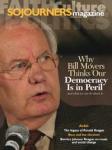It's hard for non-Catholics (and many Catholics) to understand why Archbishop Raymond Burke said that Catholic politicians who are pro-choice couldn't receive communion until they "publicly renounce their support of these most unjust practices." Communion is a rite of unity. Can a bishop do that? Do Catholic politicians have to "vote Catholic"? Why would church leaders use the altar as a rod of discipline?
Let's get a few things clear.
First, Archbishop Burke's action is not outside the Catholic Church's canon law. It is not morally unfounded. His pastoral letter "On the Dignity of Human Life and Civic Responsibility" cites Martin Luther King Jr., St. Thomas Aquinas, and the history of Jim Crow laws to make his argument. It's a rigorous, conservative appeal. Catholic teaching states that abortion is a grave sin. Some Catholics preach primus est vivere - "above all there is life." In this logic other critical issues of concern for Catholics - poverty, capital punishment, militarism, euthanasia, the sanctity of marriage, and the dignity of women, workers, and the poor - all mean nothing without the "right to life." From the primus est vivere perspective, simplistic though it is, there is no inconsistency in targeting pro-choice Catholic politicians while not calling to task Catholic legislators who, for example, support tax cuts for the rich or the war in Iraq.
Second, John Kerry is not a shining example of a Catholic legislator. At times Kerry is misguided on the difference between separation of church and state and separation of faith and life. The first must be distinguished to protect religious freedom. The second can never be separated without falling into ethical relativism. Kerry is a strong supporter of keeping access to abortion legal. In 1985, Kerry addressed the Senate, saying that "the right to choose is a fundamental right...neither the government nor any person has the right to infringe on that freedom." He takes a straightforward secularist line, which leads him to confuse moral clarity and leadership with infringement on personal rights.
Third, since the time of Constantine, religious institutions have wielded the means of their power to affect political ends. Archbishop Burke is using what's available to him.
Does John Kerry need the wisdom of his Catholic tradition to assist him in his public duty? Yes. Can a cleric, in the context of a pastoral relationship, challenge Kerry or any Catholic on the state of their conscience - even suggesting that the individual refrain from receiving communion until their state of moral ambiguity is cleared? Yes. Should a priest or bishop withhold the Eucharist from a Catholic who, after examining her conscience, presents herself for communion? Absolutely not.
The most recent Vatican document "on certain matters to be observed or to be avoided regarding the Most Holy Eucharist" advises that each communicant should "examine himself at depth and that anyone who is conscious of grave sin should not celebrate or receive the Body of the Lord without prior sacramental confession." It does not indicate that a priest can or should withhold communion. In fact, it states, "The Church has drawn up norms aimed at fostering the frequent and fruitful access of the faithful to the Eucharistic table."
HAVING SAID all that, this argument feels a bit like rearranging the deck chairs on the Titanic.
The U.S. Catholic bishops are not in a position at the moment to pass judgment on anyone. If the Vatican wants to develop documents on certain matters to be observed and avoided, I suggest they start with the log in their own eye. I recommend every Mass for the next nine years (novena-like) begin with priests asking forgiveness from parishioners for abuse of authority, lying, and giving scandal.
Bishop Burke and those who have joined him are not naive. Burke is taking his stand in Missouri, a vigorously contested "battleground state," in an election year when only one of the leading presidential candidates is Catholic. (If the Republican incumbent were also Catholic, then the issue would be different.) I have no doubt that there are powerful political interests encouraging bishops to split the Catholic Democratic vote. In the same way that the evangelical Religious Right is used to create a smokescreen for the machinations of corporate and political interests, those same interests are hijacking some Catholic bishops for agendas that are antithetical to the gospel.
It's the old bait and switch. While these bishops wave the flag of moral decency and the right to life, they obscure the agenda to systematically dismantle democratic foundations that protect the common good. Lured by short-term victories and a chance to flex their severely weakened moral backbone, these bishops are offering religious cover for corporate thieves and political usurpers.
Rose Marie Berger, an associate editor of Sojourners, is a Catholic peace activist and poet.

Got something to say about what you're reading? We value your feedback!